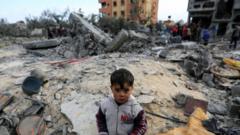Iran’s response to President Trump’s letter has sparked talks of potential indirect negotiations, reflecting a cautious approach as both countries navigate a complex diplomatic landscape.
Iran Indicates Willingness for Indirect Negotiations with Trump Administration

Iran Indicates Willingness for Indirect Negotiations with Trump Administration
Iran is open to discussing its nuclear program, indicating potential indirect talks with the U.S. following President Trump's outreach.
Iran’s foreign minister, Abbas Araghchi, announced on Thursday that Tehran has officially responded to President Trump’s recent letter urging direct negotiations regarding its advancing nuclear program. The Iranian government appears to be striking a balance, neither outright rejecting negotiations with the United States nor fully accepting the prospect of direct meetings.
Notably, the top foreign policy adviser to Iran’s supreme leader, Kamal Kharazi, stated that “The Islamic Republic has not closed all the doors and is willing to begin indirect negotiations with the United States.” This sentiment could mark a significant shift, given the long-standing absence of official diplomatic relations since the Islamic Revolution of 1979.
While Iran has indicated the potential for dialogue, Araghchi highlighted that direct negotiations are unlikely “while there is maximum pressure policy and threats of military strikes.” However, he maintained that indirect discussions remain a possibility, referencing past interactions focused on critical issues such as the nuclear program, detainee exchanges, and regional conflicts.
Iran submitted its response to Trump via Oman, which is often seen as an intermediary in U.S.-Iran relations. The contents of this reply reportedly offered a comprehensive perspective on both the issues raised by Trump and broader Middle Eastern affairs.
As tensions continue to simmer between the two nations, the prospect of indirect negotiations shows a glimmer of potential dialogue amid ongoing pressures. The coming weeks will reveal if these talks materialize or if the door to diplomatic relations will remain firmly closed.
Notably, the top foreign policy adviser to Iran’s supreme leader, Kamal Kharazi, stated that “The Islamic Republic has not closed all the doors and is willing to begin indirect negotiations with the United States.” This sentiment could mark a significant shift, given the long-standing absence of official diplomatic relations since the Islamic Revolution of 1979.
While Iran has indicated the potential for dialogue, Araghchi highlighted that direct negotiations are unlikely “while there is maximum pressure policy and threats of military strikes.” However, he maintained that indirect discussions remain a possibility, referencing past interactions focused on critical issues such as the nuclear program, detainee exchanges, and regional conflicts.
Iran submitted its response to Trump via Oman, which is often seen as an intermediary in U.S.-Iran relations. The contents of this reply reportedly offered a comprehensive perspective on both the issues raised by Trump and broader Middle Eastern affairs.
As tensions continue to simmer between the two nations, the prospect of indirect negotiations shows a glimmer of potential dialogue amid ongoing pressures. The coming weeks will reveal if these talks materialize or if the door to diplomatic relations will remain firmly closed.






















